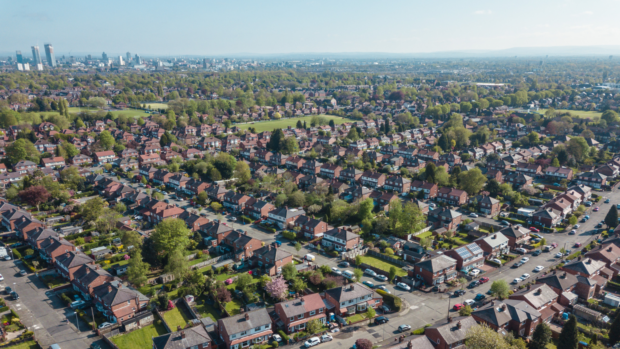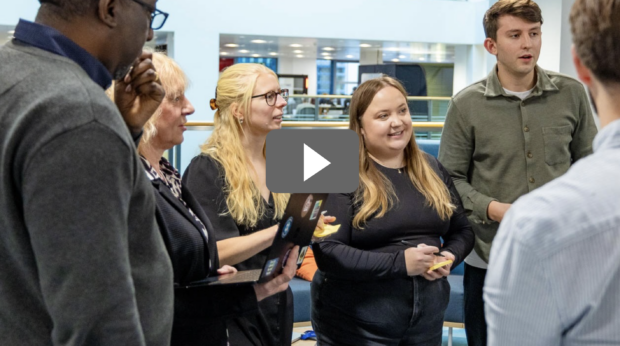
Planning documents often contain vast amounts of valuable information, but accessing and using this data can be challenging. Artificial intelligence (AI) offers a potentially promising solution by efficiently processing and interrogating large volumes of data to extract key information and insights.
The MHCLG Digital Planning Programme partnered with Faculty AI, a specialist in applying AI and technology, on a 6-week project to explore the potential of AI to extract specific information from planning documents.
Understanding that it's difficult to manually extract and analyse important information from local plans (policy documents that specify how much and where future development in an area should go), we decided to see if AI could make this process easier. By using AI, we aimed to speed up the extraction of key information and improve its accuracy and accessibility, helping planning officers find content and numerical information more easily, and allowing us to design a possible classification system that reflects the content of a plan.
The partnership made two important breakthroughs. Firstly, we were able to create a chatbot that can pull out important information from local plans and that uses the data in these plans to answer questions based on what it finds.
To test the chatbot’s accuracy, the team used 2 methods:
- Asking questions that required numerical answers, like the number of homes to be built in an area over a certain time and the timeline covered by a local plan.
- Asking open questions, such as ‘What is my local council doing about climate change?’.
The chatbot correctly answered questions about how many homes were to be built within a specific time frame 59% of the time, and during the lifetime of the local plan (normally 15 years) – 76% of the time. When answering the question on climate change, we received 43% correct responses.
Secondly, we developed a common way to classify and organise local plans. This classification system, called a standard taxonomy, helps organise items based on their features or relationships. By analysing over 120,000 pages from 100 local plans using a large language model (a model trained to work with immense amounts of data that’s capable of understanding and responding in everyday language), the team created a standardised table of contents for these plans.
These results show that AI has promise in navigating the complexities of planning documents and data, particularly given the time and effort usually required for such tasks, but highlights that the results are dependent on the quality of the input data.
Providing better access to planning data and establishing consistent data standards is a programme priority and one we’ve recently spoken about.
This 6-week project was a first look at how AI could streamline aspects of the planning process. It shows that AI has the potential to make a big impact. Just like in other fields, AI offers a chance to automate administrative tasks and greatly improve our planning public services. While there are some limitations to using AI in the planning system, the real question is how we can get the most value out of AI to help planning professionals focus on more important, strategic decisions.
As well as this short project, we are working with the sector and Local Planning Authorities through the PropTech Innovation Fund to see how AI can help with processing and organising feedback and consultation representations.
We’re always keen to learn and collaborate with others leading the way. Please reach out to our team by emailing digitalplanningteam@communities.gov.uk.
You can also watch this video presentation for more information on the project.



5 comments
Comment by Chris D posted on
Hi,
It would be useful to have your view on "what it would take" to get the issue of "missing" data standards resolved? E.g. a private members bill, an amendment to an existing bill, unilateral voluntary adoption of your desired standard by Local Planning Authorities or something else entirely?
While it's great that public bodies are collaborating to share data with each other, that doesn't resolve the problems faced by those of us who would like to use geospatial (and other) open data but who work outside the sector.
So my question is: would it be worth several data teams across government coming together to publically sum up what it would take to get "missing" data standards adopted (or at the very least the ones affecting the geospatial community)?
It goes without saying, but I will say it anyway: a suitable resolution of this long standing matter would save us all a lot of time, money and grief!
Thanks.
Comment by Paul Downey posted on
Great question Chris. I'm Paul Downey, the Service Owner for planning.data.gov.uk, a platform which aims to make planning and housing data easier to find, understand, use and trust.
The AI project used data we'd collected on local plans which included a list of local plan documents you can see on this prototype: https://local-plans-prototype.herokuapp.com/local-plans
We have an open process to identify and design the data for the platform which depends upon contributions and feedback to help us prioritise and shape data specifications: https://design.planning.data.gov.uk/
Once we're assured a specification meets needs, can be legally kept, and easily maintained, and we've piloted the data with data providers and data consumers, there are powers within the Levelling Up and Regeneration Act to establish the data as a standard on planning authorities: https://www.legislation.gov.uk/ukpga/2023/55/part/3/chapter/1/enacted
Comment by Chris D posted on
Aha, I see. Thanks very much for explaining, Paul.
Comment by Julian Sadler posted on
How important is it to get the right skills for users as well as the right tech? Do you see a big skills gap currently?
Comment by Paul Downey posted on
Thanks for the great question Julian. We think it’s important to get both right.
Digital planning is about understanding users, and finding ways of meeting their needs in ways which best work for them. This was an evaluation of a new technology to understand how it could be used to help meet real user needs.
In terms of skills, the Open Digital Planning (ODP) https://opendigitalplanning.org/ community offers training and learning and development to Local Planning Authorities (LPAs) who are funded as part of ODP.
Similarly our PropTech innovation fund supports the use of services by LPAs which demonstrate the value in providing standardised data that can be used to inform faster and more open decision making, which may be informed using AI and other approaches.